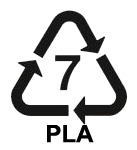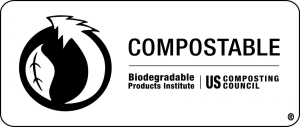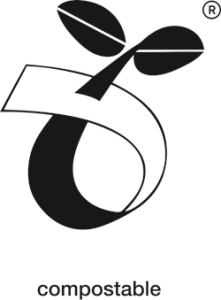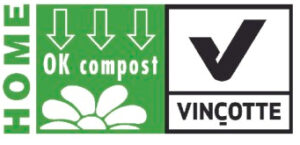Is biodegradable plastic compostable plastic?
(NOTE: You might also like this more recent post about #7 PLA plastics.)
The plastics industry has been working at a fevered pace to develop new resins with environmental benefits. Older polymers can have degradation rates spanning 1,000 years or more.
Recycling traditional resins has long been a part of the waste management landscape. But the introduction of various “degradable” resins is relatively recent.
Only 9 percent of the 32 million tons of plastic waste generated in the U.S. in 2012 was recovered for recycling. Obviously, there is plenty of room for improvement. (FACTOID: 32 million tons is equal to 1,218,208,000,000 20-ounce PET water bottles.)
Much of the industrial world is pushing toward zero waste goals. Manufacturers have designed resins that disintegrate over a more reasonable period time. They need exposure to light, oxygen and/or other degradation catalysts.
- Among the offered benefits are —
- Lower energy requirements during manufacture,
- The ability to recycle the plastic as a composting feedstock, and/or
- Properties that allow the resin to break down in landfills or natural environments.
But products carry a multitude of labels with “degradable” claims. How is the average consumer supposed to figure out what to buy? What goes where when sorting for recycling?
If the package says the plastic is “degradable” or “biodegradable,” is it compostable?
Look for the labels

The international coding system currently used for plastic products identification is less than ideal. It was originally designed for the plastics industry, not consumers. Codes are often hard to find and barely legible, and when it comes to compostable plastics — confusing.
As most folks know, plastics carry various recycling symbols to indicate resin type. For compostable plastics, look for the No. 7 symbol inside a triangle of chasing arrows.
Unfortunately, this is a catch-all category for plastics not otherwise classified, which lumps compostables in with non-compostables like plastic lumber and safety glasses. So in addition to the No. 7, compostable plastic also carries the letters “PLA” below the No. 7.
If the plastic is marked No. 7 and “O” or “Other,” do not throw it in the compost bin.

Another label to look for is the “compostable” certification label of the U.S. Composting Council and Biodegradable Products Institute. There are multiple variations of this label in circulation. Each indicates that the plastics used meet ASTM specifications D6400 or D6868 for USCC-BPI compostable compostable products as tested and certified by ASTM International, a standards organization.
In Europe, where there are multiple certification agencies, the standard to look for is EN 13432/EN 14995, indicated by the “seedling” symbol.
Be aware that “green” is a ticket to higher sales in the marketplace. In the absence of regulations, products sometimes claim to be compostable (or otherwise degradable) without having been tested and EU compostable certified. To be sure you are purchasing a compostable plastic, look for certification from a legitimate testing agency.

But also know that some manufacturers have certified their products, but choose to design and use their own “compostable” symbols. Irish cup manufacturer Down2Earth Materials is one example.
When in doubt, check the manufacturer’s website or read fine print on packaging to see if any certifications are mentioned.
‘Compostable’ may not be right for home systems
Vincotte OK home compostable logoFFor the home composter, few compostable plastics are appropriate for the backyard compost pile. In truth, the composting methods used by most municipal and commercial facilities can’t handle “compostable” plastics, either. Of the nearly 5,000 composting facilities in the U.S., only a handful utilize the robust, high-rate technologies required.

Generally, an industrial composting facility is needed to successfully compost these industrial resins.
The U.S. Composting Council has model legislation for states to use in developing regulations governing labeling and certification for compostable plastics. This document may be viewed/downloaded from the Council’s Compostable Plastics Task Force page. It includes a special label to indicate suitability for home composting.
The “OK Home” label and certification is already in use in Europe. It indicates products that can compost at the lower temperatures common to backyard composting environments. The certification entity, Vinçotte, has been verifying compostables since 1995.
Biodegradable vs. compostable
A rock may “degrade,” but it’s not compostable. A plastic may be “compostable,” but it won’t biodegrade in water or soil. When it comes to the semantics of the plastics business, the use of specific words or terms printed on labels may not be generic or interchangeable.
Terms don’t always conform to industry standards. Product claims may not result from testing and certification. To ensure you’re paying for the right product, look for a legitimate “compostable” label and certification.
- If you are uncertain as to the compostability of the plastic —
- If your locale is not serviced by a facility that can process compostables —
- If the plastic is not certified for your home compost bin —
then a more traditional plastic that can be recycled in your community might be the better choice. It’s better to recycle a traditional plastic than landfill a compostable plastic.
BTW — never toss a compostable or other bio-plastic in with recyclable plastics. Even small amounts of these resins can foul an entire processing batch for your local recycler. When in doubt about which products to buy or how to recycle them, contact your local recycling coordinator.
If you are in an area served by a McGill composting facility:
McGill facilities are industrial composting operations using high-rate processes. We accept a wide variety of biodegradable materials, including compostable plastics. Our service focus is high-volume generators requiring transportation for roll-off box or tractor-trailer loads.
We can transport or you can transport, provided your vehicle is commercially licensed, covered, capable of safely tipping into our receiving area, and transported by a CDL-licensed driver. Hard hats and safety vests are required. Intake is by contract only.
As our process is highly controlled and quite robust, we may be able to degrade more bio-based products than just those certified as “compostable.” Please use our online contact form or call our corporate office at 919-362-1161 for additional information.
If your generation volumes are too small (bins or carts) for roll-off box services:
McGill does not provide a collection service for individual households or small businesses. We cannot offer customer drop-off for any feedstock that isn’t transported in commercially-licensed vehicles meeting our minimum standards.
But we do work with collection companies specializing in services to low-volume food waste generators in the commercial, institutional and residential sectors. If you would like a referral to one of these companies, or if you provide this type of service and would like to be included on McGill’s referral list, please contact us.
You might also like this video: